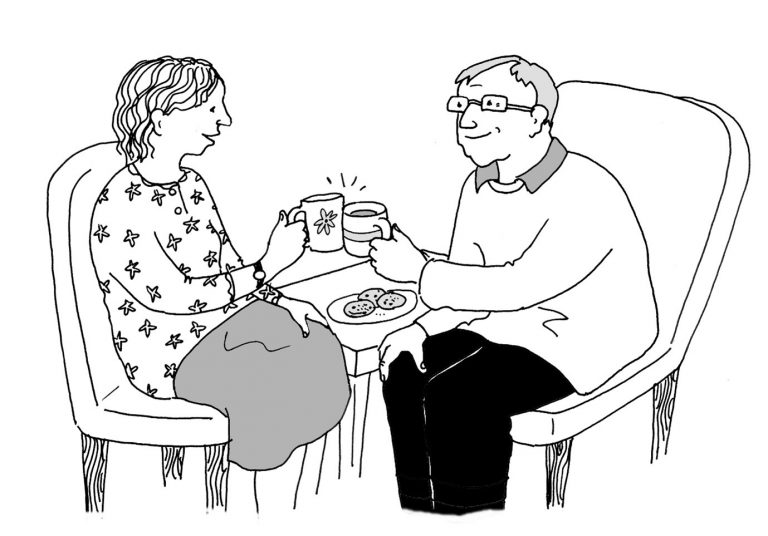Making a virtue of necessity
The benefits of going virtual
When I started training for Understanding Dementia, it was mostly one-off face-to-face sessions delivered to teams or groups. A half-day training would give a good introduction to the Understanding Dementia approach. But in the past I have often had issues when I have attended single training sessions.
- Ideas that sound fine in the classroom don’t always work in practice.
- Valid new ways of thinking can easily get quashed in task-orientated culture.
- There’s no time for new skills to become embedded.
- There’s often no chance to ask any questions that crop up afterwards.
These problems seem to occur a lot with mandatory courses for health and care professionals!
During lockdown in 2020 our only option was to take our training online. I wanted to avoid the pitfalls of tick-box online courses (another feature of some mandatory training), so our sessions were to be interactive. I had already attended some webinars, so I had a rough idea what was involved.
However, I wasn’t at all sure how well this would work with stressed-out family carers. Would they want to spend time in front of a screen on a regular basis? Would older carers manage the tech? How would they cope if they had problems joining the session? What if they lost their signal halfway through?
As an experiment we set up some Zoom meetings for family carers to attend some introductory sessions. Our training coordinator Lucy sent reminders beforehand, and sometimes after we’d started, if someone was missing! If anyone had technical difficulties she supported them by phone, and she generally kept things running smoothly.
Lockdown led to the development of our training courses
We offered an optional series of follow-on sessions at weekly intervals, covering various aspects of our approach in more detail. All the family carers enrolled and it became an eight-week course. We could offer support to carers in lockdown, something which would otherwise have been impossible.
Moreover we discovered some unexpected benefits to online training:
- Courses were available to anyone with internet access.
- No substitute care was needed.
- There were no travel or parking issues.
- Distance was no object.
- Family members living apart could attend courses together.
We divided the course content into bite-sized chunks. Each hour-long session included a short PowerPoint presentation with plenty of time for Q&A and discussions. After each session trainees could reflect and practise any new skills. The following week, they discussed how they had got on before we went on to the next topic.
Over the weeks, carers talked about the way the approach was working out for them. It became clear that they were starting to think differently and to respond to the person with dementia more positively. As time went on, this new mindset gradually became embedded and their new skills developed. Techniques that had initially seemed counterintuitive began to feel more natural, even intuitive.
After completing the course we invite family carers to join a private online group for ongoing discussion and support.
We now run courses for family carers throughout Wokingham on behalf of the local authority.
In 2021 we started running nine-week courses for health and care professionals. This too worked well, and again there were advantages to online training.
- No travel time or expenses, so training budgets could stretch further
- Daytime options for trainees joining via work
- Evening options to join independently without requiring study leave
- Staff could attend safely while self-isolating.
Delivering these courses in small bites with time for reflection and practice in between sessions has worked well. Sessions begin with trainees discussing snippets from their week. These often include lightbulb moments or unexpected successes they’ve had as they put into practice techniques they learned in previous sessions.
This year I was asked to run a course at short notice for staff from several care homes in another part of the UK.
- Discussions could include dementia-related work issues from that morning.
- Trainees could start to apply tips from that day’s session during their shift.
- Trainees met like-minded staff in other care homes and felt less isolated.
Afterwards we invite participants to join a separate private online group to continue discussions and support with fellow professionals who have completed our training.
We have had fantastic feedback from trainees on both types of courses. Health professionals at all levels say that they have gained new insights from the course. Family carers say they are finding their situations more manageable. They both report a reduction in behavioural issues and improved well-being in the people they support.
We are now looking to grow our training team so we can spread our message further.
To enquire about joining our team please contact info@understandingdementia.co.uk or for more information on our courses see our website https://understandingdementia.co.uk/



